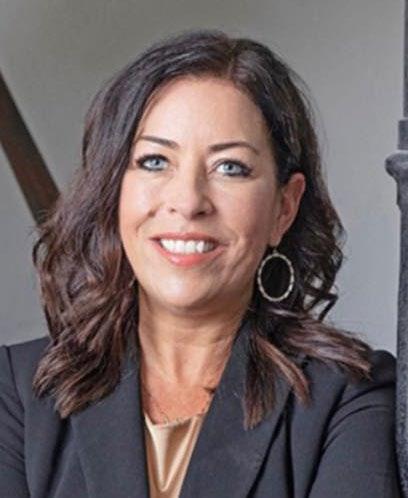Group in Forrest City buys
Guest Column:
It’s time to rethink submitted photos
By Lance Brownfield


Group in Forrest City buys
Guest Column:
It’s time to rethink submitted photos
By Lance Brownfield

It’s been 57 years and counting for Glenda Arnett-Tripp serving as the face of the local newspaper in Brinkley, the Monroe County Argus
“I graduated from Brinkley High School in 1967 and started working at the newspaper,” Arnett-Tripp said. “My twin sister (Linda Bline of Brinkley) first got the job, but she didn’t like it. So, I told her I thought I would give it a try. I did like it and I’ve been here ever since.”
Arnett-Tripp began with duties such as typing copy in the old hot metal and Linotype days and helping compose short local news items. But over the years her duties grew, and spanning an amazing career, she has taken on virtually all the tasks associated with the weekly newspaper field.
Today, she is the only employee of the Argus, keeping office hours in downtown Brinkley four days a week and covering occasional night and weekend events as needed.
“I guess the thing I like the best about it is getting out and meeting and seeing people,”
Arnett-Tripp keeps busy covering Brinkley and other communities in Monroe County, such as Clarendon, Roe and Holly Grove. She spends her Tuesday afternoons delivering papers in outlying areas and then Wednesday morning doing the same in Brinkley.

Arnett-Tripp said. “It’s just become a part of me. I could retire, but I don’t want to. I never was one to just sit at the house. I would rather be out working and doing. I think it helps keep you young.”
The newspaper is now published by Andrew Bagley, who also is the co-owner of the Helena-West Helena World. Bagley currently serves as president of the Arkansas Press Association. The Helena staff paginates the Argus each week and both newspapers are printed in Monticello.
“It’s very important for a small town to have a newspaper,” Arnett-Tripp said. “It helps keep people informed about what is going on. People here still seem to appreciate having a newspaper.”
Local merchants still support the newspaper, and she enjoys visiting with them when making her ad-selling rounds. “They very seldom turn me down when we have a promotion going,” she said.
In addition to the obvious technology and production changes over the years, ArnettTripp said communication modes clearly have changed. “People don’t bring or call in news items as much as they used to,” she said. “I think Facebook has quite a bit to do with that.” Also gone are the days when each of the small rural communities in the county had a correspondent who contributed what were called “local news items” – visitors to homes, trips out of town and other family-oriented happenings.
Arnett-Tripp’s first editor was Mason Clifton, who published the Brinkley Argus for more than 40 years with his daughter, Flora Jean Clifton Elledge, and her husband, Franklin Hoover Elledge. The Elledges ran the newspaper for a few years after Clifton’s death before selling it to Thomas and
Continued from page 1
Katie Jacques in 1995.
The Jacques also published the Monroe County Sun in Clarendon, which earlier had been purchased by Clifton and his family. They merged the two Monroe County newspapers into the Central Delta Argus-Sun in 2007. The newspaper was sold in 2017 to Hayden Taylor, who at 19 years of age was then one of the youngest publishers in Arkansas and the United States. He changed the name of the publication to the Monroe County Herald
Bagley and Chuck Davis bought the newspaper in 2022 and rebranded it as the Monroe County Argus
Thomas Jacques continues to live in Brinkley and covers city council and school board meetings for the newspaper. He is employed as assistant director of the Delta Cultural Center in Helena.
Through it all, for almost six decades now, Glenda Arnett-Tripp has been the constant. For her remarkable service to the community, she was awarded the APA’s Golden 50 Service Award in 2019.
“Glenda is an invaluable member of our team and definitely an asset to the city of Brinkley,” Bagley said in an earlier APA article. “Words don’t adequately describe her impeccable character, work ethic and pure heart. I am fortunate to know her and the Argus would not be where it is today without her efforts.”
Every year since 1971, Arnett-Tripp has taken a photo of the Citizen of the Year as selected by the Brinkley Chamber of

Commerce. Last year, when getting ready to take the photo, she was caught off guard when her name was announced for the honor.
“They began reading about the person, and I couldn’t really hear what they were saying when they announced the winner,” she said. “I asked my sister, ‘Whose name did they call?’ and she said, ‘it’s you.’”
“I was shocked,” she said, noting that everyone in the community was aware of it except her. “After they announced it, all my kids and family members started coming in and congratulating me. They did a great job of hiding it from me.”
Arnett-Tripp has lost two husbands, one to an automobile accident and another to cancer. She has been married to George Tripp for about a year. She also lost a son, Brandon Dunavan, in 2010, but has two remaining – Brian Dunavan, the fire chief at Searcy, and Blake Dunavan, who works at GreenPoint Ag in Brinkley. She also has six grandchildren (four of them married) and one great-grandchild.
When not at work, she enjoys going shopping with her friends and is very active in the First Assembly of God Church in Brinkley.
Looking ahead, she has no immediate plans to retire. “I plan on continuing as long as my health holds up — and I feel good.”
When remembering her first day at work many years ago, she said, “At the time, I was just looking for a job,” adding with a laugh, “I guess I didn’t know what I was getting into. And now I wouldn’t know how to do anything else.”

In a move that returns the newspapers to local ownership, Times-Herald Publishing in Forrest City has been purchased from Argent Arkansas News Media by Johnson Media Group, LLC, owned by Rob and Tamara Johnson of Forrest City. The announcement was made on Tuesday.
Tamara Johnson currently serves as publisher for the Times-Herald, which is printed twice weekly, as well as the weekly Courier-Index, which serves Lee County, and the East Arkansas Advertiser, which circulates in Cross, St. Francis and Lee Counties.
“We were given an opportunity to buy the newspapers and to continue providing a local news source for St. Francis and Lee counties and across the region with the East Arkansas Advertiser,” she said. “We firmly believe that our communities need local newspapers, which is why we decided as a family to step up and continue this operation.”
Times-Herald Publishing will continue to be operated by its current staff, with some members of the Johnson family stepping into larger roles. Brodie Johnson, who has worked for the past six years as a reporter/ photographer, has been promoted to managing editor. Hilary Johnson Trickey is joining the staff as director of digital operations. Other long-time employees remaining with the newspaper include Teresa Wall, office manager; Bill McLoud, advertising sales; Teresa McCrary, press operations; Mae Watson, composing and Bobby Teal, circulation.
The oldest business in St. Francis County, the Times-Herald entered its 154th year of publication last week. The newspaper was purchased in 1931 by Fred N. McCollum, who also owned the Monroe County Sun in Clarendon, and stayed in the family for three generations. Trent Bonnor McCollum succeeded his father as publisher in 1963 and Weston McCollum Lewey took the helm in 1984 and served
RATE CARDS REQUESTED

Tamara Johnson
as publisher until the newspaper was sold to Argent Arkansas News Media, now a division of Horizon Publications, in 2016.
The Courier-Index was established in 1872 as the Marianna Index and merged in 1917 with the Lee County Courier. In its debut issue, publisher H.M. Jackson wrote, “We intend to have a paper that the people of our county will not be ashamed of, and that all, someday, may feel proud of it.” Jackson served as APA President in 1924. Following his death in 1934, his wife, Cordelia Ricketts Jackson, continued publishing the Courier-Index until 1949, when she sold her interest to Roy H. Caldwell and his son, Marvin Caldwell. Marvin Caldwell published the newspaper with his wife, Dorothy Reddell Caldwell, until his death in 1983. Dorothy Caldwell continued as publisher until selling the newspaper in 1985 to General Media, Inc. Argent Arkansas News Media purchased the newspaper in 2016.
“Our hope is that by returning these newspapers to local ownership, we will be able to give our advertisers more for their money and provide a better news product for our readers,” said Johnson. “We will do whatever is necessary to keep these newspapers open and continue providing the quality journalism that our readers have come to expect.”

Jillianne Moncrief has been named editor of The Sun, Paxton Media Group announced on November 8. She succeeds former editor Gretchen Hunt in the role.
Moncrief transferred to Jonesboro from PMG-owned WPSD-TV in Paducah, Kentucky.
A native of McLemoresville, Tennessee, Moncrief earned a bachelor’s degree in communications from the University of Tennessee at Martin in 2020, where she worked as a part-time reporter for the campus newspaper, The Pacer, and became heavily involved with the campus radio station, WUTM-FM 90.3 “The Hawk.” While at UT-Martin she won several regional and national awards for her work. She started at WPSD in 2019 as a web editor, before becoming a news producer in 2021 and working her way up to be the morning executive news producer in 2023. Joining her in Jonesboro are her husband, Beck, and stepson, Logan.
“I’m excited to serve as editor for The Sun,” Moncrief said in the announcement of the promotion. “The switch from TV to print news has been an interesting journey and I am looking forward to being part of an important resource for our community.”
Additionally, Kevin Brown is now serving as marketing director of The Sun in advance of the retirement of long-time advertising director Lisa A. Lynn at the end of the year. Lynn will remain available to The Sun as a consultant.
As we prepare for 2024, APA needs your current rate cards and media kits. Please send rate cards, circulation info and demographics, if available, to rebecca@arkansaspress.org so that we can make sure we have the most up-to-date information on file.


The 2nd Annual Center for Integrity in News Reporting Awards is now open for entries from news organizations in the United States.
Four $25,000 awards will be presented to the best and most impartial news reporting in four categories: Print Reporting, Broadcast Reporting, Cable Television Reporting and Digital Reporting. No editorials or columns may be submitted.
The Center was created by WEHCO Media Inc. Chairman Walter E. Hussman, Jr., former Jackson, Mississippi Clarion Ledger editor Charles Overby and current WEHCO Media Publisher Eliza Gaines to address a growing national problem — the public’s loss in trust in news reporting — and to help find solutions to restore that trust. The awards are designed to encourage and reward “news reporting that has the courage to not fear and the discipline to not favor.”
In the inaugural contest held earlier this year, Chris Fulton of APA Media Member Mountain Home Observer was named a finalist in the digital reporting category for his piece, “Mountain Home School Board –Arkansas FOIA Violations.”
The deadline to enter the 2025 contest is January 31. For more information about The Center for Integrity in News Reporting, visit www.cfinr.org. To enter the contest, visit https://bit.ly/CFINR2025.

This past Monday we honored those who served. In this photo, seaman Scott Grim reads his hometown Berryville Star-Progress while stationed in California with the Navy during World War II. According to Grim’s grandson, Scott Whiteley Carter, Grim was ineligible for the draft as a father of three and the last of his name, but felt compelled to serve, so enlisted at age 31. Photo courtesy Scott Whiteley Carter.
Three people affiliated with APA have been named the 2024 Arkansas Business “Arkansas 250”, an index of 250 of the state’s most influential leaders.
APA Immediate Past President and Publisher at WEHCO Media, Inc. Eliza Gaines, Arkansas Democrat-Gazette Senior Editor Rex Nelson and APA Executive Director Ashley Kemp Wimberley were all named to this year’s cohort.
According to Arkansas Business, selections to the Arkansas 250 are made by its editors based on merit in business and community.






By Lance Brownfield
Submitted photos have become all but ubiquitous in today’s news world. As newsrooms around the country were reshaped by the dawn of the Internet Age, submitted photos became more commonplace. Thinning staff and the advent of “backpack journalists” in the early 2000s contributed to the necessity of the growing practice. As a result, today many small town newspapers don’t have a photo department or even a single photographer on staff.
Usually this isn’t a problem as most individuals and organizations are agreeable to send in their shots, but new technology has called into question the integrity of digital imagery as a whole.
Earlier this year, media outlets raised concerns about the dangers of counterfeit pictures when a photo of Princess Kate and her kids, which was published by AP, Reuters, Getty, Agence FrancePresse and countless publications around the world, was found to have been doctored. However, in worldwide coverage of the incident there seemed to be more emphasis on the companies and individuals who use AI and image editing software than how the media handled it. There was little talk about what newsrooms should consider in way of policy changes as the proliferation of generative AI continues.
One staggering statistic in a European Union Law Enforcement Agency report found that 90% of online content could be generated by AI by the end of 2025. Globally, the AI imagery industry is predicted to rise in value over 250% to $900 million by
2030.
I believe it’s growing more important by the day to pay attention to the photos we use in publication as digital manipulation and generation continue to spread. And it’s important to involve the readership and make them aware of the decisions being made about the content featured in the pages of the local press.
As AI and photo editing software become more sophisticated and widespread, local newsrooms should reevaluate their policies on accepting and running submitted photos. I suggest that publications with the proper means consider enforcing a strict no submitted photos policy in the near future, or that submitted photos be accepted only from trusted sources after a contract is signed to the effect that no manipulated images will be accepted. And each news organization should publish their photo and AI policies in print and online for all to see.
The problem is that when we run submitted photos, increasingly we’re gambling with peoples’ trust. It can be next to impossible for a busy editor to thoroughly examine each photo for manipulation before it runs. And once it runs and is found out to be a fake, we as journalists have an obligation to our audience to inform them of our mistake. When we’ve lost the audience’s trust, it can be very difficult to regain it.
Neiman Lab published an article last year offering guidelines for news orgs to handle AI. The piece looked at what newsrooms

Continued from page 6
all over the world are doing to address the issue and some of the key concepts they found vital were oversight, transparency, accountability and responsibility and banned and allowed uses.
Many publications embrace the new technology, using guardrails to slowly implement it, while others avoid it altogether. Scandinavian outlets Aftonbladet and VG (both owned by Norwegian media company Schibsted) ruled that their journalists may “use AI technology in their work to produce illustrations, graphics, models.” VG, more cautiously, added a ban on generating photorealistic images because “AI-generated content must never undermine the credibility of journalistic photography.”
Perhaps one of the best safeguards against public outcry is transparency. British outlet The Guardian, for example, committed to openness with their readership whenever they use generative AI, clearly labeling all AI-generated content they publish.
The New York Times put it well in their “Principles for Using Generative A.I. in the Times’s Newsroom,” originally adopted March 14, saying, “We are always responsible for what we report, however the report is created. Any use of generative A.I. in the newsroom must begin with factual information vetted by our journalists and, as with everything else we produce, must be reviewed by editors.”
While some stories call for AI imagery, to illustrate a point about the technology itself, most local papers will rarely have a need for these kinds of pictures. In those rare cases, the paper can make the
decision to run the pictures once approved by an editor. Again, these instances should be clearly marked to avoid the perception that a fake image is being presented as reality.
With the technology readily available at our fingertips, it can easily be misused to spread false/inaccurate information. It’s available on our phones and computers through Google, Photoshop, Canva and many other digital tools used by the public. Even small tweaks to photos completely remove their credibility and accuracy to the truth. It can be tempting for many to edit headshots and portraits to be more flattering, but this opposes basic journalistic standards. This issue is complex and will need to be addressed as it becomes harder to discern truth from fiction in cyberspace. While AI images may seem harmless to many citizens and business owners submitting photos to their local paper, they degrade the central tenet of journalism — presenting only the truth to the community.
Lance Brownfield is an Arkansas native and staff writer for AY Media Group. He’s been a staffer at The Sentinel-Record and The Malvern Daily Record and has written freelance for the Arkansas Advocate as well as the South China Morning Post, The Diplomat and China Christian Daily. He currently serves as the secretary for the Society of Professional Journalists’ Freelance Community and previously served as secretary for the Arkansas Pro Chapter of the SPJ. He has a degree in Innovative Media from Henderson State University.
